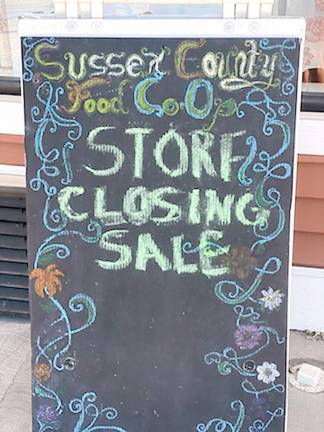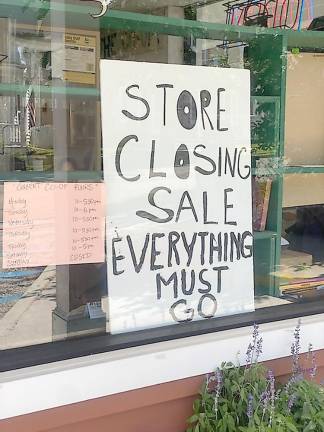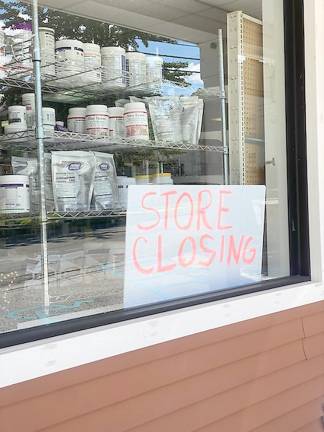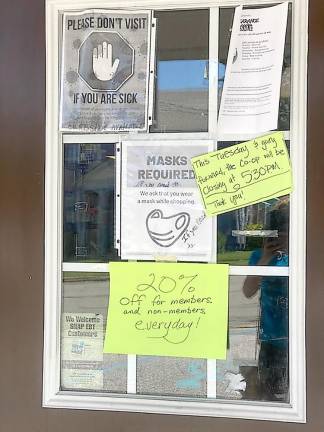The sun sets on health food co-op, beloved throwback to the ‘80s
Newton. Sussex County Co-Op closes after 42 years as purveyor of granola, supplements, and sage advice.




A well-loved go-to place for healthy foods, supplements, bulk nuts, grains and cereals, herbs, and sage advice, served up in a welcoming, throw-back-to-the-’80s-esque atmosphere, is closing its doors. The Sussex County Food Co-Op on Moran Street in Newton has everything on clearance and is expected to close within the month.
“It’s 50 years ago now, but back then, health food became huge, and groups locally in Newton, Sparta, and especially in Peter’s Valley were selling health food,” said Jim Fiola, who, along with his wife, Kim, had been involved in what was to become the Sussex County Food Co-Op for more than 30 years. “The groups realized that if they could band together, they could offer more and at better prices.”
It was the ‘70s. Along with bell-bottomed jeans and the rise of disco and rollerskating, it was the dawn of the health food boom.
“One thing led to another, and the Sussex County Co-Op was formed in 1980 as a not-for-profit,” Fiola said.
The co-op started in Sandyston then moved to a space in a strip mall on Route 206 in Andover. From there, it moved to Spring Street in Newton.
“With some growing pains, we moved to the final location, on Moran Street, about 1998,” Fiola said. “That’s when the co-op took on more of a retail sort of atmosphere. There were always your purists involved in running it that didn’t quite approve of the retail atmosphere, but across the board, people loved our co-op.”
In the early days, the co-op was the only show in town offering health-conscious items.
“Then ShopRite and other supermarkets started carrying organic foods, and it started to become available online on Amazon and the like,” Fiola said. “When Covid hit, people changed the way they shopped. We changed too and offered pick-up, but Amazon was so convenient and had bigger buying power.”
Another trend he saw in the store’s twilight years was customers picking the brains of its very knowledgeable staff — and then ordering elsewhere, where products are cheaper.
“We re-opened after Covid in June of 2020, but people had changed their shopping habits,” Fiola said. “Membership diminished.”
Starting in the early years, the co-op put two prices on everything: one for members and one for non-members. Members paid a set annual fee to get the discount and also committed to volunteer at the store for a certain number of hours.
Fiola said the co-op’s demise was sealed when the building was sold to house a New Jersey state office. (He’s not sure which one.)
“The health food stores that survive are rare now,” he said. “There are fewer than 200 across the nation. The ones in Vermont and Maine stay strong because they’re the only game in town and have built up multi-million dollar inventory and include indoor restaurants and coffee shops.”
Kitchen in the co-op
Daniel Kitchen quickly discovered the co-op, which was then located on Spring Street, after moving to Newton in 1983.
“I was raised in a home with vitamins and whole foods, and both of my parents were raised on farms, so I had the consciousness to eat healthy,” he said.
At that time, the co-op was what Kitchen calls “a rather homespun facility.” Noticing the double pricing on everything, he became member.
“I’m an activist person, so I got involved,” he said. “A short time later, I found myself being asked to run for the board. It was hard to find people to be on the board. Eventually, myself and Barbara Parker, who had owned an Army/Navy store on Spring Street, rotated being president and chairman. The co-op’s bylaws stated that a position could only be held for one year, so since no one else stepped up, we rotated for a number of years.”
He remained on the board until 2001, when he left Newton.
“Nowadays you can go to any supermarket, and they have a host of organic things,” Kitchen said. “What set the co-op apart was its bulk items like granola and nuts. If you were a member, especially, you couldn’t beat those prices.”
Kitchen really enjoyed his years of co-op work. He fondly remembers reaching out to the company that supplied the co-op with its raw milk cheese.
“It was some process to see how they tested the milk for bacteria,” he said. “We’d buy 20 blocks at a time, and it’s much better for you than pasteurized cheese because it still has all of the good things that nature put in the milk. Pasteurization takes those away.”
A fond adieu
Deborah Drumm of Stillwater is a nurse practitioner who integrates alternative therapies, including herbs and aromatherapy, into her practice.
“I will miss Reid Giacomarra, the herbalist at the co-op, as well as their bulk oatmeal and the spices,” she said. “Oh, the spices. The store’s resources, camaraderie, great values, and superior knowledge about herbs and natural healing will be sorely missed.”
Giacomarra, who studied under world-renowned herb expert Dr. David Winston, will miss the co-op, a place she’s co-managed for the past 16 years.
“It has been largely about healthy food and supplements, but it’s also been a place where people meet and hang out,” she said. “I wish we had had the space to have couches and make it more of a hang out, kind of like a health food coffee shop atmosphere.”
Giacomarra will be pursuing her herbalist specialty as a solo act now. Her co-manager, Debbie Simpson, who has been at the store for more than 20 years, will also be greatly missed for her knowledge and love for the co-op.
“Years ago, that was the only place that had Tofuti dairy free ice cream and egg replacer, so I could make a cake for our very allergic son,” said customer Maureen Newman.
Perhaps customer Lisa Pachnos summed it up the best, with one word about the closure.
“Nooo!” she exclaimed.
The store was bare on Monday as items were selling out faster than expected. Even the fixtures are for sale.
“The sun is setting after 42 years,” Fiola said. “It’s been a good run.”